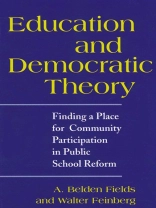A ground-breaking look at how access to decision making in the public schools can be extended to all, even previously excluded segments of the community.
Winner of the 2001 American Educational Studies Association Critics’ Choice Award
Much has been made of the gap between public schools and the communities that they serve. This book shows how a group of teachers, parents, and community people in ‘Ed City’ formed an educational reform group-the Project for Educational Democracy-to increase access to decision making in their school system, especially for members of the community who had previously been excluded. A combination of ethnographic research and theoretical reflection, this book addresses concepts of community, authority, representation, participation, and democracy.
Table of Content
Acknowledgments
Introduction
Chapter One. Democracy in Small Places
Chapter Two. A Failed Attempt
Chapter Three. Engaging in Democratic Discourse Democratically (with Norman Denzin)
Chapter Four. Race and School in Ed City (with Norman Denzin)
Chapter Five. The PED’s Challenge to Traditional Authority: The School Board
Chapter Six. The Meeting of Bureaucratic and Dialogical Authority: The District Committee
Chapter Seven. Cooperation and Co-optation
Chapter Eight. Conclusion: Competing Conceptions of Democratic Education and Theory
References
Index
About the author
Walter Feinberg is professor Emeritus of Philosophy of Education at the University of Illinois. His most recent book is Educating for Democracy. Bryan R. Warnick is the Daniel Tanner Foundation Professor of Education at Ohio State University.












